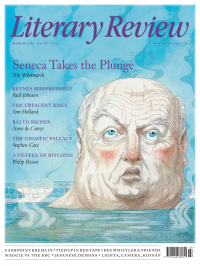Robert Chandler
More than Mandelstam
On editing a new anthology of Russian Poetry
English-speakers tend to assume that Russian literature is primarily a matter of long and very serious novels, but Russians themselves think otherwise. In a previous anthology for Penguin Classics I set out to show that Russian short stories are at least as lively, witty and thought-provoking as the Russian novel. In a new anthology, The Penguin Book of Russian Poetry (Penguin Classics), I and my co-editors have tried to do something similar for poetry. If Russian poetry is less widely known than Russian prose, this is simply because, for the main part, it is harder to translate. But the number of good translations is increasing (recent examples include the late Stanley Mitchell’s outstanding Eugene Onegin, Angela Livingstone’s translations of Marina Tsvetaeva and Peter Daniels’s translations of Vladislav Khodasevich) and this is a good time to be compiling an anthology.
The two most important decisions I took were to invite two Russian-American poets, Irina Mashinski and Boris Dralyuk, to be co-editors. Both are poets in their own right. Boris was only eight when he emigrated to the United States in 1991; unlike either Irina or myself, he is truly bilingual.

Sign Up to our newsletter
Receive free articles, highlights from the archive, news, details of prizes, and much more.@Lit_Review
Follow Literary Review on Twitter
Twitter Feed
It wasn’t until 1825 that Pepys’s diary became available for the first time. How it was eventually decrypted and published is a story of subterfuge and duplicity.
Kate Loveman tells the tale.
Kate Loveman - Publishing Pepys
Kate Loveman: Publishing Pepys
literaryreview.co.uk
Arthur Christopher Benson was a pillar of the Edwardian establishment. He was supremely well connected. As his newly published diaries reveal, he was also riotously indiscreet.
Piers Brendon compares Benson’s journals to others from the 20th century.
Piers Brendon - Land of Dopes & Tories
Piers Brendon: Land of Dopes & Tories - The Benson Diaries: Selections from the Diary of Arthur Christopher Benson by Eamon Duffy & Ronald Hyam (edd)
literaryreview.co.uk
Of the siblings Gwen and Augustus John, it is Augustus who has commanded most attention from collectors and connoisseurs.
Was he really the finer artist, asks Tanya Harrod, or is it time Gwen emerged from her brother’s shadow?
Tanya Harrod - Cut from the Same Canvas
Tanya Harrod: Cut from the Same Canvas - Artists, Siblings, Visionaries: The Lives and Loves of Gwen and Augustus John by Judith Mackrell
literaryreview.co.uk